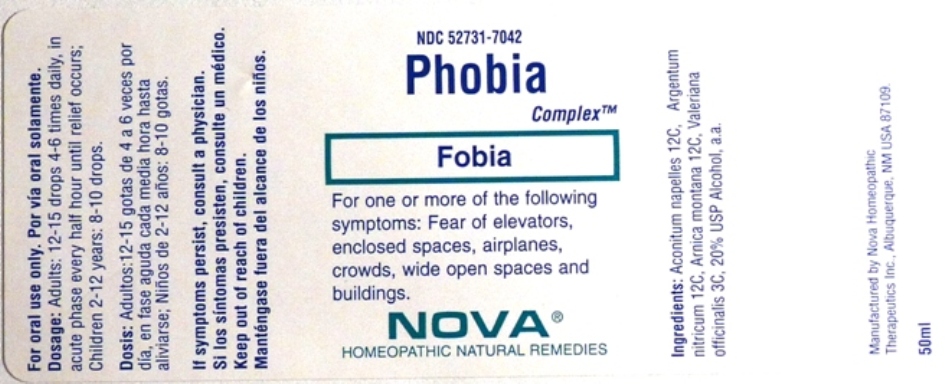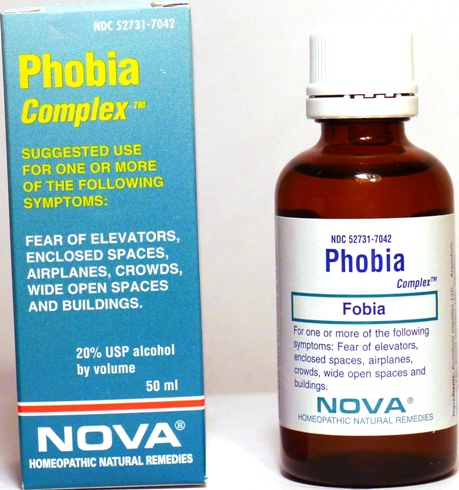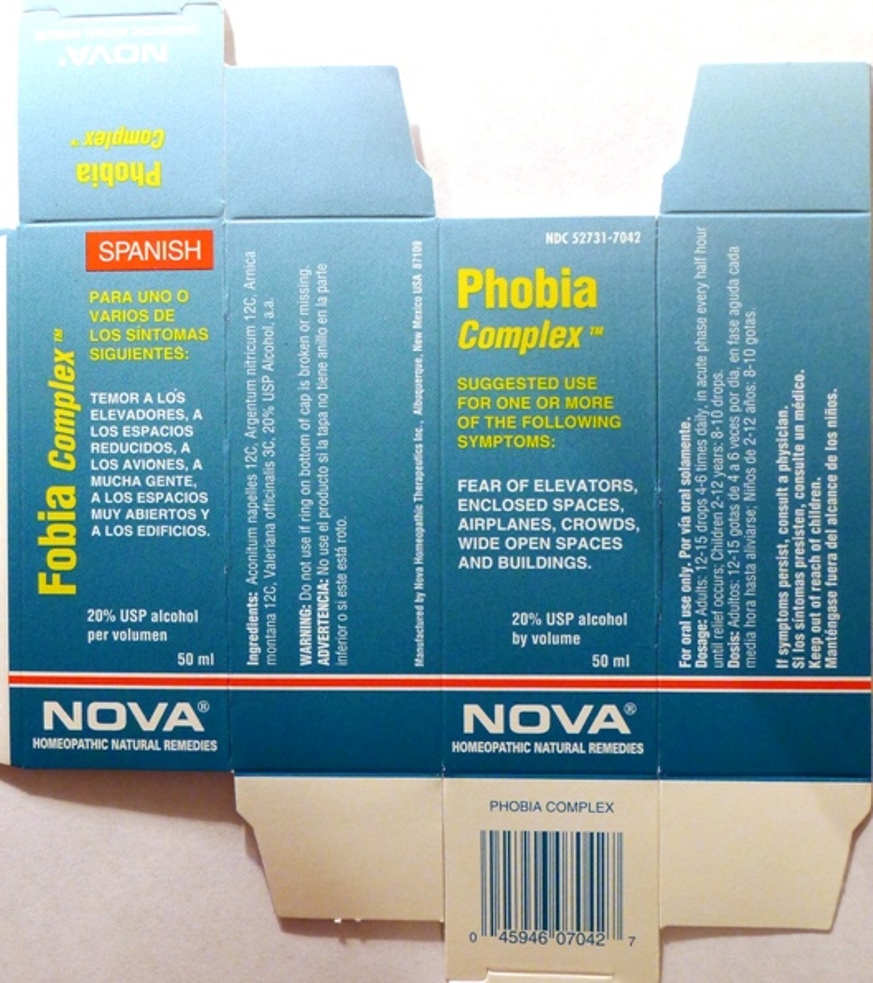
Phobia Complex | Aconitum Napellus, Argentum Nitricum, Arnica Montana, Valeriana Officinalis Liquid while Breastfeeding
What is Phobia Complex | Aconitum Napellus, Argentum Nitricum, Arnica Montana, Valeriana Officinalis Liquid ?
Purpose: Suggested use for one or more of the following symptoms: Fear of elevators, enclosed spaces, airplanes, crowds, wide open spaces, buildings.
Phobia Complex | Aconitum Napellus, Argentum Nitricum, Arnica Montana, Valeriana Officinalis Liquid safe in breastfeeding?

Note: Due to high dilution of active ingredients in homeopathic medicines most homeopathic medicines are safe while breastfeeding.
Phobia Complex | Aconitum Napellus, Argentum Nitricum, Arnica Montana, Valeriana Officinalis Liquid Breastfeeding Analsys
Aconitum napellus while Breastfeeding
SafeThe flowers and roots and leaves of this herbaceous plant are used. It contains sesquiterpene lactones, essential oil, flavonoids and traces of pyrrolizidine alkaloids. Topical use on whole skin. Indications in traditional medicine without evidence of its effectiveness: topical anti-inflammatory in bruises, sprains and localized muscle pain (EMA 2014). Do not apply to damaged skin It is very toxic orally (Anderson 2017), having described gastroenteritis, cardiac arrhythmia, neurological problems and death (WHO 2007 p.77, nal 2001) in people who took it and a case of severe hemolytic anemia in 9-day-old newborn whose mother was taking arnica infusion (Miller 2009). At the date of the last update, we did not find published data on its excretion in breast milk. The small dose and poor plasma absorption of most topical dermatological preparations make it unlikely that a significant amount will pass into breast milk. Do not apply on the breast so that the infant does not ingest it, or in large areas or for prolonged periods to avoid systemic absorption. Hands should be washed after applying arnica to avoid possible contact with the infants mouth.
Silver nitrate while Breastfeeding
SafeCAS Number: 7761-88-8
Avoid using it on the breast or cleanse thoroughly before nursing.
Arnica montana while Breastfeeding
SafeCAS Number: 977000-27-3

Se utilizan las flores y también raíces y hojas de esta planta herbácea.Contiene lactonas sesquiterpénicas, aceite esencial, flavonoides y trazas de alcaloides pirrolizidínicos.Uso tópico sobre piel íntegra.Indicaciones en medicina tradicional sin pruebas de su eficacia: antiinflamatorio tópico en contusiones, esguinces y dolores musculares localizados (EMA 2014). No aplicar sobre piel dañada.Es muy tóxica por vía oral (Anderson 2017) habiéndose descrito gastroenteritis, arritmia cardiaca problemas neurológicos y muerte (WHO 2007 p.77, n.a.l. 2001) en personas que la tomaron y un caso de anemia hemolitica grave en un recién nacido de 9 días cuya madre tomaba infusión de arnica (Miller 2009). A fecha de última actualización no encontramos datos publicados sobre su excreción en leche materna. La pequeña dosis y la escasa absorción plasmática de la mayoría de preparaciones dermatológicas tópicas hacen poco probable el paso de cantidad significativa a leche materna. No aplicar sobre el pecho para que el lactante no lo ingiera, ni en áreas extensas o por periodos prolongados para evitar absorción sistémica. Conviene lavarse las manos después de la aplicación de arnica para evitar un posible contacto con la boca del lactante.
Valerian while Breastfeeding
Low RiskCAS Number: 8057-49-6
At last update significant data on breastfeeding were not found. A commonly used herb in many cultures and countries, even during pregnancy and breastfeeding with very few reported side-effects. Whenever not abused it has a low toxicity. Moderate use is considered to be compatible with breastfeeding, however because of the possibility of sedative effect in infants should better be avoided in cases of prematurity and in the neonatal period. Be aware of sedative effects in the infant. Roots, rhizomes and stolons of the plant are used. It contains iridoids, valepotriates, steroids, essential oils, GABA and tannins. Unproven beneficial effects in adults: sedative, hypnotic, anti-spasmodic. Indication after Commission E of German Ministry of Health: insomnia, nervousness, anxiety. Maximal daily dose: 9 g (2 g of dried extract)
Phobia Complex | Aconitum Napellus, Argentum Nitricum, Arnica Montana, Valeriana Officinalis Liquid Breastfeeding Analsys - 2
Valerian while Breastfeeding
CAS Number: 8008-88-6; 8057-49-6

Valerian (Valeriana officinalis) root contains mono- and sesquiterpenes, and iridoid triesters (valepotriates). Preparations are sometimes standardized on valerenic acid content. Valerian has no specific uses in nursing mothers, but is most commonly used to treat anxiety and sleep disturbances, and occasionally for self-treatment of postpartum blues or depression.[1][2] No data exist on the safety and efficacy of valerian in nursing mothers or infants. In general, valerian is well tolerated, with side effects such as dizziness, hangover or headache reported occasionally. Valerian is "generally recognized as safe" (GRAS) for use in food by the U.S. Food and Drug Administration. Valerian is often not recommended during lactation because of the theoretical concerns over its valepotriates and baldrinals which have been shown to be cytotoxic and mutagenic in vitro. Because there is no published experience with valerian during breastfeeding, an alternate therapy may be preferred, especially while nursing a newborn or preterm infant. Dietary supplements do not require extensive pre-marketing approval from the U.S. Food and Drug Administration. Manufacturers are responsible to ensure the safety, but do not need to the safety and effectiveness of dietary supplements before they are marketed. Dietary supplements may contain multiple ingredients, and differences are often found between labeled and actual ingredients or their amounts. A manufacturer may contract with an independent organization to verify the quality of a product or its ingredients, but that does certify the safety or effectiveness of a product. Because of the above issues, clinical testing results on one product may not be applicable to other products. More detailed information #about dietary supplements# is available elsewhere on the LactMed Web site.
I already used Phobia Complex | Aconitum Napellus, Argentum Nitricum, Arnica Montana, Valeriana Officinalis Liquid and meanwhile I breastfed my baby should I be concerned?
Homeopathic medicines usually do not cause harmful effects on breastfed babies. Phobia Complex | Aconitum Napellus, Argentum Nitricum, Arnica Montana, Valeriana Officinalis Liquid is a homeopathic medicine and if your baby does not have any abnormal symptoms then there is nothing to worry about. Some homeopathic medicines contain alcohol (ethanol) and such homeopathic medicines in high dosage can have bad effect on development of baby.
My doctor has prescribed me Phobia Complex | Aconitum Napellus, Argentum Nitricum, Arnica Montana, Valeriana Officinalis Liquid, what should I do?
Homeopathic medicines are usually safe in breastfeeding and if Phobia Complex | Aconitum Napellus, Argentum Nitricum, Arnica Montana, Valeriana Officinalis Liquid has been recommended by doctor then there should be no doubt about its usage in breastfeeding.
If I am using Phobia Complex | Aconitum Napellus, Argentum Nitricum, Arnica Montana, Valeriana Officinalis Liquid, will my baby need extra monitoring?
Not really.
Who can I talk to if I have questions about usage of Phobia Complex | Aconitum Napellus, Argentum Nitricum, Arnica Montana, Valeriana Officinalis Liquid in breastfeeding?
US
National Womens Health and Breastfeeding Helpline: 800-994-9662 (TDD 888-220-5446) 9 a.m. and 6 p.m. ET, Monday through Friday
UK
National Breastfeeding Helpline: 0300-100-0212 9.30am to 9.30pm, daily
Association of Breastfeeding Mothers: 0300-330-5453
La Leche League: 0345-120-2918
The Breastfeeding Network supporter line in Bengali and Sylheti: 0300-456-2421
National Childbirth Trust (NCT): 0300-330-0700
Australia
National Breastfeeding Helpline: 1800-686-268 24 hours a day, 7 days a week
Canada
Telehealth Ontario for breastfeeding: 1-866-797-0000 24 hours a day, 7 days a week
